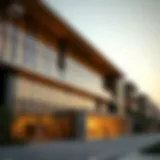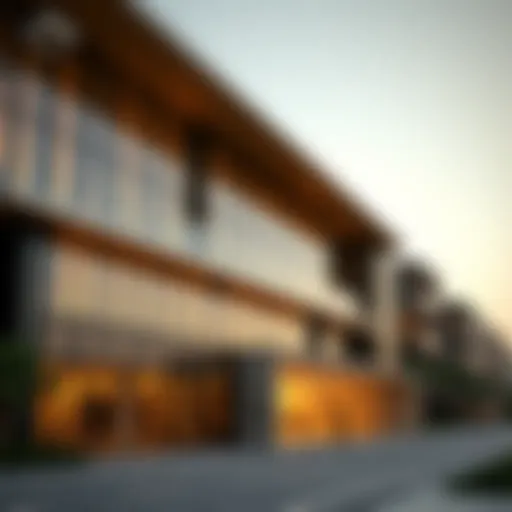Affordable Schools in Dubai: An In-Depth Guide


Intro
In recent years, Dubai has become a focal point for expats and locals alike, not just for its vibrant economy and dazzling skyline but also for its educational landscape. As the city expands, so does the need for affordable yet quality education options for families. Navigating the waters of education provision in such a bustling metropolis can be complex. Parents often grapple with various choices, weighing the cost against the educational excellence and holistic development their children require.
Choosing a school is an emotional and economic decision, and with many moving parts, it’s easy to feel overwhelmed. Factors like curriculum offered, school location, and additional extracurricular activities can greatly influence the cost of education. This article unpacks the abundant choices in the realm of affordable schools in Dubai, casting a spotlight on significant criteria that families should contemplate when selecting an educational institution for their children.
Market Trends
In understanding the dynamic nature of affordable schooling in Dubai, it’s essential to grasp prevailing market trends. The educational landscape is shifting, paralleling the economic growth of the city.
Current Real Estate Trends in Dubai
Real estate in Dubai has undergone a transformation that impacts educational facilities. The surge in more affordable housing has indirectly driven families toward specific neighborhoods, thereby shaping the demand for educational institutions nearby. The affordability of certain residential areas correlates directly with lower tuition fees in nearby schools. As families flock to these neighborhoods, schools are not only compelled to keep up with the influx but also must ensure education quality remains high amidst rising enrollments.
Localities like Dubai Silicon Oasis and Dubai Investments Park have experienced a construction boom, with options for low to mid-range housing attracting families who prioritize budget-friendly living without sacrificing access to educational facilities. This trend has encouraged schools to adapt, offering competitive rates and various curricula tailored to the demographic shifts.
Future Forecasts for the Dubai Property Market
Looking ahead, experts predict a steady demand for affordable education will continue as the city attracts more international professionals. As businesses thrive, so too will populations, necessitating an expansion in educational resources. Schools acknowledging this need may enhance programs and facilities to accommodate growing student bodies while refining their fee structures. Families can anticipate a range of affordable options, marked by diversity in curricula—be it the British curriculum, American curriculum, or the International Baccalaureate—catering to a cosmopolitan audience of learners.
"The growth of affordable education options is closely tied to Dubai’s real estate developments and demographic changes. As neighborhoods evolve, so too do the educational institutions serving those communities."
Arming families with knowledge about market trends not only allows for well-informed decisions but also scratches beneath the surface of factors impacting the overall quality of schooling in Dubai. Through recognizing these relationships, parents can better navigate their options, ensuring their children receive the education they deserve.
Preamble to Education in Dubai
In the heart of the UAE, Dubai has transformed into a global hub, not just for business but also for education. The landscape of education in this vibrant city is as dynamic as its skyline. This article seeks to explore the intricate facets of education within Dubai, with a specific emphasis on affordable schools. Accessible and high-quality education is an essential pillar for many families in the region. It is not only about molding future leaders but also about ensuring that financial limitations do not hinder a child's academic growth.
The Evolution of Dubai's Education System
The educational system in Dubai has undergone significant changes over the years. Initially, education was largely informal, with parents passing down knowledge orally. However, as Dubai developed, a more structured form of education emerged. The establishment of schools began in the mid-20th century, and by the late 1970s and early 1980s, the government started to invest significantly in formal education. Today, the Dubai education market offers a variety of options. From public schools that follow a national curriculum to a plethora of private institutions featuring diverse international curricula like the British, American, and IB programs, the choices are plenty. The emphasis on improving educational quality has also led to various regulatory bodies stepping in to ensure that standards are maintained. This evolution highlights not just a response to demand but a commitment to a well-rounded and globally competitive education system.
Significance of Affordable Education
The significance of affordable education cannot be overstated. As Dubai continues to grow and attract expatriates, the demand for quality education that is also budget-friendly is pressing. Affordable schools help provide every child, regardless of their socioeconomic background, with an opportunity for a brighter future. This accessibility supports inclusivity, allowing for a diverse mix of students to learn together, fostering cultural understanding and collaboration.
Moreover, affordable education serves as a compass for families trying to navigate rising living costs while ensuring their children receive a decent education. Parents often engage in a balancing act; they need to consider tuition fees alongside other expenses. It’s crucial for them to understand the available options that meet their financial constraints without compromising on quality. The educational landscape is evolving fast, and recognizing the importance of affordable schools allows families and stakeholders to make informed choices that benefit future generations.
Types of Schools Available
Understanding the types of schools in Dubai is essential when exploring affordable education options. Each school type offers distinct advantages, catering to diverse needs and preferences of families. By grasping the differences and benefits of each category, parents can make sound decisions that align with their financial and educational aspirations for their children.
Public vs. Private Schools
In Dubai, public schools and private schools offer varying degrees of quality, cost, and curricula. Public schools are government-funded and generally tuition-free for Emirati students, but expatriate children might face cost implications. The curriculum in public schools typically follows the UAE Ministry of Education guidelines, focusing on Arabic and Islamic studies, which can be a boon for parents looking for culturally aligned education.
On the flip side, private schools cater to a wide range of educational philosophies and budgets. They charge tuition fees and are known for their curriculums based on British, American, or the International Baccalaureate frameworks. Parents often lean towards private schooling for the perceived higher quality of education or specialized programs, particularly if they seek international qualifications. The diversity in teaching methods, extracurricular activities, and school facilities in private institutions can contribute significantly to a child’s overall educational experience.
However, affordability remains a key consideration; private school tuition varies considerably. Some institutions charge very high fees, while others aim to attract budget-conscious families by maintaining manageable pricing structures.
International Schools and Curricula
International schools in Dubai are popular among expatriates due to their familiarity with various educational systems and global perspectives. These schools typically offer curricula such as the British, American, Australian, French, and International Baccalaureate which align closely with what parents may be accustomed to back home.


The advantage of international schools lies not just in the curriculum, but also in the culturally diverse environment they provide. This can facilitate easier adjustment for children who move frequently due to family relocations. However, tuition fees in these schools can range widely, making some options less accessible for families with tight budgets.
To navigate the available choices, parents should consider which international curriculum best suits their child’s future aspirations, as well as the cost of attendance. Many international schools also offer financial assistance programs, scholarships, or sibling discounts to support families seeking quality education at a reduced cost.
Special Needs and Inclusive Education Options
The scene for special needs education in Dubai has improved significantly. Several schools provide inclusive education, where children with special needs are integrated into regular classrooms alongside their peers. Such schools often have specialized resources and trained personnel to cater to various learning disabilities, ensuring that all students have access to quality education.
The government is also actively promoting inclusive education practices, aligning with global standards, which encourages many private and international schools to adopt similar policies. However, not all schools are equipped to facilitate such programs, so parents must carefully evaluate the resources, support staff, and environment.
For families of special-needs children, the choice of school can dramatically affect educational quality and emotional wellbeing. Understanding the school’s approach to inclusivity and available support services will be crucial in the decision-making process.
Factors Influencing Affordability
When discussing affordable schools in Dubai, one cannot overlook the diverse factors that contribute to making education accessible for a range of families. Understanding these elements is crucial for parents, stakeholders, and indeed anyone looking to navigate the educational landscape in this dynamic city. Let’s break down these critical components that influence affordability.
Tuition Fees and Payment Structures
Tuition fees are arguably the most direct financial consideration parents face when evaluating schools. In Dubai, these fees can vary significantly between public and private schools, as well as among different private institutions. Public schools, which primarily serve Emirati students, generally have lower fees compared to the plethora of private schools serving expatriate communities. This fact alone influences the choices many families make.
For private institutions, fees may depend on the curriculum offered—like British, American, or IB (International Baccalaureate). Schools charging higher fees often promise state-of-the-art facilities or smaller class sizes, but it’s key to decipher if these add-ons genuinely translate to better education.
Moreover, many schools offer flexible payment structures, such as installment plans that allow families to spread tuition payments across the academic year, easing immediate financial burdens. Some institutions might even provide discounts for early payments or siblings enrolled in the same school, which could enhance affordability for families with multiple children.
Government Policies and Funding
The role of government policy in education cannot be understated. The Dubai Education Council and other regulatory bodies play significant roles in setting frameworks that directly impact school funding and, consequently, tuition costs. Special initiatives and regulations support affordable access to education, aiming to ensure that quality education isn’t just reserved for the affluent.
The government invests in public schools significantly, providing decreased tuition costs for Emirati students, which indirectly affects the overall market for private education. Furthermore, there’s a drive to increase public-school capacity to accommodate the growing population, thus potentially reducing pressure on private institutions to inflate their fees due to demand.
Additionally, there are ongoing discussions and pilot programs aimed at enhancing funding models that could lead to improved affordability in private schooling as well. Such measures range from grants provided to schools based on performance and transparency in tuition structures that allow families to make informed choices.
The Role of Scholarships and Financial Aid
Scholarships and financial aid programs serve as lifelines for many families looking to provide quality education without breaking the bank. Schools in Dubai are increasingly acknowledging the economic diversity of their student bodies and are offering various types of scholarships. These range from merit-based awards to need-based assistance, aimed at leveling the playing field.
While international schools may seem out of reach for some, those that offer substantial financial aid can make a significant difference. For instance, a top-tier institution may offer scholarships based on academic excellence or talent in arts and sports, enabling deserving students to access opportunities they may not have otherwise.
Furthermore, organizations and institutions outside of schools, such as local businesses and philanthropic groups, often collaborate with educational entities to provide additional funding options and resources. This financial assistance can significantly alleviate financial burdens, ultimately leading to greater student diversity within schools.
"Accessibility and affordability must coexist in educational environments, fostering diverse communities of learners."
Overview of Affordable Schools
Understanding the landscape of affordable schools in Dubai is crucial for parents, investors, and community stakeholders who wish to navigate the intricacies of the educational sector in this rapidly evolving city. With a growing populace and diverse demographic, families are increasingly seeking quality education that doesn’t break the bank. Affordable schools serve as a compelling solution, offering numerous benefits that cater to the educational needs of various social strata.
When considering what defines an affordable school, several elements come into play. Typically, these institutions maintain lower tuition fees while promoting high academic standards and a supportive learning environment. This can include a variety of curricula, extracurricular activities, and access to resources that foster holistic education. Not to mention, opting for these schools can significantly ease the financial burden associated with raising children in an ever-developing urban setting like Dubai.
Notable Institutions Offering Affordable Education
In the realm of affordable education, several institutions stand out as champions of cost-effective learning. Schools such as The International School of Arts and Sciences and Dubai British School Jumeirah Park offer quality education without suggesting an exorbitant fee structure that often characterizes higher-end private institutions.
These schools have managed to carve a niche for themselves through innovative teaching methodologies, trained faculty, and an environment conducive to learning. They not only focus on academic excellence but also emphasize character building, encouraging students to engage in community services — making them all-around options for families seeking a balanced educational approach.


Academic Performance and Reputation
Quality education is more than just tuition fees; it’s about the outcomes. Many affordable schools, contrary to common perceptions, achieve remarkable academic performance that rivals, and sometimes surpasses, their pricier counterparts. These institutions generally employ qualified teachers who are dedicated to fostering student success.
Furthermore, the reputation of a school can have a ripple effect in the community. Schools happily boasting high scores in student assessments or excellent graduation rates gain a positive local reputation, drawing parents who want the best for their children yet are constrained by budget. This is often evaluated through links to assessment bodies or performance rankings in resources like edu.ae, a valuable tool for parents considering their options.
Location and Accessibility
Accessibility plays a pivotal role when selecting a school, especially in a sprawling metropolis like Dubai. Many affordable institutions are strategically located near residential areas; for example, schools in neighborhoods such as Deira or Bur Dubai provide convenient options for local families.
Additionally, public transport links further increase accessibility, allowing students from various areas to attend schools with robust reputations. Some institutions even offer transportation services, reducing travel strain on families, which can be a deciding factor when evaluating schooling options. Understanding the geographical dynamics can help parents make informed decisions about where to place their children for an optimal educational experience.
"Selecting the right school for your child can be a daunting task, especially when balancing affordability without compromising quality."
The myriad of affordable schools in Dubai represents a possible pathway toward educational equity, ensuring that quality education isn't just a privilege reserved for the affluent but a fundamental right for all. As families continue to explore their options, the importance of these institutions is likely to grow, making it essential for stakeholders to maintain awareness of this evolving landscape.
Comparative Analysis of Educational Quality
In the quest for affordable education in Dubai, it's paramount to scrutinize the quality of education provided by various institutions. A comparative analysis can reveal the strengths and weaknesses of different schools, helping families make informed decisions. Understanding educational quality goes beyond just looking at tuition fees; it encompasses the curriculum, assessment methods, and the overall environment that nurtures students.
Curriculum Standards and Assessment
Curriculum standards set the benchmarks for educational performance. Different schools may follow distinct education systems: British, American, IB, or others, each with its own set of objectives and assessments.
Evaluating these curriculums can show how they prepare students for future challenges. For example, the British curriculum is well-structured, focusing on critical thinking from an early age, making it appealing to many parents. However, it might lack in fostering creativity compared to the IB, which encourages analytical skills and alternative perspectives in students.
Assessments play a crucial role as well. It is vital that parents consider the method of evaluation—whether it’s standardized tests, continuous assessments, or practical evaluations. Some schools lean heavily on exams, while others may focus on project-based learning, which can be more beneficial for students who might not test well under pressure. In Dubai, schools such as Dubai American Academy have a reputation for maintaining high academic standards combined with innovative assessment methods.
Extracurricular Activities and Support Services
Extracurricular activities are often the hidden gems in evaluating schools. They not only enrich the learning experience but also help students develop social skills, teamwork, and leadership qualities. Affordable schools, in particular, may have limited resources for extracurricular programs, yet the presence of any activities—be it sports, arts, or clubs—can signal a commitment to holistic education.
Moreover, support services, like counseling and tutoring, are essential for students who might need additional help. Some schools, despite lower tuition fees, invest in these supports, creating an inclusive environment for all learners. Participating in such activities can enhance a child's educational journey, promoting personal growth alongside academics.
Faculty Qualifications and Training
The caliber of teachers is perhaps the most critical determinant of educational quality. Teachers' qualifications can vastly differ between institutions. In affordable schools, while some educators may possess excellent training and experience, others might not have the same level of credentials or training opportunities.
It’s essential to look for schools that prioritize faculty development—this could be in the form of ongoing training, workshops, or advanced degrees. A school might employ a highly qualified staff but if there is no emphasis on continuous learning and adaptation to modern teaching methods, the quality may not be as high as expected. For example, schools like GEMS Dubai American Academy employ teachers holding advanced degrees and encourage professional development as a means to maintain educational excellence.
Overall, conducting a comparative analysis of educational quality can illuminate the paths to affordable yet high-caliber education in Dubai. It empowers parents and students alike to seek out institutions that best match their educational aspirations, thereby ensuring a beneficial educational experience without breaking the bank.
Parental Considerations and Decision-Making
When it comes to the abundance of schools in Dubai, parents face a true quest—sorting through a maze of options to find the best fit for their child’s education. This section highlights why evaluating schools carefully is a key component in the educational journey, how to transform vague ideas into concrete choices, and the importance of fiscal planning in the realm of education.
Evaluating School Options
Choosing the right school doesn’t merely flip a coin; it involves diving into specifics. Parents must consider factors such as the school’s curriculum, teaching philosophy, and most importantly, alignment with their child’s unique learning style.
- Curriculum: Familiarize yourself with the variety offered—ICSE, IB, British, American—each with its own merits and challenges.
- Culture and Environment: Investigate how schools promote a sense of community. Is it focused on academia, or does it celebrate a well-rounded experience?
- Visit and Observe: Nothing beats visiting the school. Get a feel for the atmosphere by attending an open house or setting up a meeting with faculty. Ask tough questions.
"The best school for your child is where they feel valued and challenged, not just one with the greatest reputation."


Budgeting for Education Expenses
Education can take a huge chunk out of a family budget, especially in a city like Dubai, where costs can skyrocket. It’s essential for parents to compute not only tuition fees but also ancillary expenses. These can sneak up like a cat on a mouse, including:
- Uniform Costs: Most schools require uniforms, which can vary widely in price.
- Extracurricular Fees: After-school clubs, sports teams, and other activities often come with added costs.
- Transportation: Whether arranging school buses or private transport, this can add significantly to monthly budgets.
- Materials and Supplies: Don’t forget computers, textbooks, and additional learning materials.
So, how can families manage? Setting up a realistic budget from the get-go is key. Create a spreadsheet that lists all potential costs; it may be tedious but will save a lot of headaches later on.
Community Involvement and Feedback
Engagement with the school community plays a pivotal role in a child’s educational experience. When parents get involved, it not only fosters a sense of belonging but also provides insights into school operations. Conversations with other parents are like gold; they can offer recommendations, share experiences, and caution against potential pitfalls.
- Join Parent Associations: Many schools have these groups that help relay feedback to the faculty. It’s a great way to contribute and stay informed.
- Actively Participate: Attend school events and meetings. The more involved you are, the more you’ll understand what really goes on behind closed doors.
- Feedback Loops: Schools often conduct surveys. If they welcome your feedback, voice your opinions. It can have a direct impact on your child’s experience.
Investing time to consider these elements thoughtfully can create a solid framework for decision-making. Parents who navigate these waters with diligence are much better equipped to find the ideal school for their children, ensuring both quality education and the responsible management of household finances.
Future of Education in Dubai
The landscape of education in Dubai is continuously transforming, driven by a myriad of factors ranging from economic growth to technological advancements. As we delve into the future of education in this vibrant city, it's critical to acknowledge the potential shifts that may occur, impacting both learners and educators. By understanding these dynamics, stakeholders such as investors, homebuyers, and developers can make informed decisions regarding educational facilities, real estate investments, and community engagement.
Trends in Educational Investments
Recent years have seen increasing investments in the educational sector across Dubai. Both private and public entities are recognizing the intrinsic link between quality education and economic prosperity. This increasing investment trend paves the way for several opportunities:
- Emergence of New Schools: With the booming population, new affordable schools are sprouting up, catering to diverse educational needs.
- Educational Innovations: Institutions are bolstering their offerings with innovative programs, like STEM initiatives, which attract families looking for enhanced learning experiences.
- Partnerships with Technology Providers: Schools are teaming up with tech companies to integrate modern technologies, improving the quality of learning and teaching.
It’s worth noting that investors are keenly observing these trends as they directly correlate with the demand for housing and community amenities. For instance, neighborhoods closer to high-quality yet budget-friendly schools tend to see a spike in property value.
Impact of Technology on Education
Technology is a game-changer, not just for businesses, but also for education systems. In Dubai, the adoption of EdTech is reshaping how education is delivered:
- Online and Hybrid Learning Models: Schools are now offering blended learning options, allowing students to balance traditional classroom experiences with online learning, which may be more economical and flexible.
- Personalized Learning: The use of AI tools enables tailored educational experiences according to each student’s needs, maximizing their potential. This adaptability can be crucial in a multicultural setting like Dubai.
- Enhanced Teacher Training: Technology aids in professional development for educators, ensuring they are well-equipped to teach in modern classrooms.
The shift towards technology not only enhances learning but also reduces overhead costs for schools, which can, in turn, benefit parents looking for affordable education options.
Sustainability and Educational Policies
As Dubai positions itself as a global hub for sustainability, the educational sector is also looking to align with these values. Future policies may focus on:
- Green School Initiatives: New educational facilities may be designed with sustainability in mind, featuring energy-efficient systems, reducing the overall cost of operation.
- Curricula that Promote Environmental Awareness: Schools will likely incorporate environmental education into their curricula, fostering a new generation of environmentally conscious citizens.
- Government Incentives for Sustainable Practices: The government might establish incentives for schools that adopt sustainable practices, further encouraging affordability without compromising quality.
Stakeholders should pay close attention to these evolving policies, as they will affect everything from school operations to the overall appeal of a neighborhood.
In Dubai, the future of education rests on a foundation built by investments, technology, and sustainability, fostering an environment where quality education becomes accessible to all.
In summary, the future of education in Dubai is poised for exciting changes, fueled by investments and advancements in technology, underpinned by a strong commitment to sustainability. Families and investors who navigate this landscape with a keen understanding will find themselves at an advantage.
The End
The significance of the concluding section in this article cannot be overstated. It serves as a crucial recap of the extensive discussion surrounding affordable schools in Dubai, emphasizing not just the availability of such institutions but also their impact on families and the broader community. As we wade through the complexities of educational options, understanding the implications of affordability is paramount.
Summation of Key Insights
At the heart of this overview lies the realization that while Dubai is often viewed through the lens of luxury and high-cost living, there exists a robust framework for affordable education that offers families viable alternatives. Here are key insights gathered throughout the article:
- Variety of Options: The education landscape in Dubai is diverse, offering everything from public schools with nominal fees to affordable private institutions that still maintain strong academic reputations.
- Academic Quality: It’s not all about the price; quality is equally crucial. Many affordable schools maintain high standards in their curriculum and foster environments conducive to learning.
- Government Support: Government initiatives play a significant role in regulating school fees and offering financial aid. The policies in place help ensure that educational opportunities are accessible to wider segments of the population.
- Community Impact: Affordable education not only benefits families but also contributes to the community’s growth and cohesiveness. Schools often serve as hubs for community interaction and development.
- Investment in Future: Finally, understanding affordability in education is an investment in the future. Parents who make informed decisions about their children's education can significantly influence their success and opportunities.
In summation, the journey through understanding affordable schools in Dubai reveals a complex yet manageable landscape. For investors, homebuyers, and developers, recognizing the value of these schools not only informs real estate and investment decisions but builds a foundation for fostering a vibrant community that values education.















